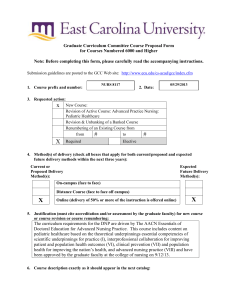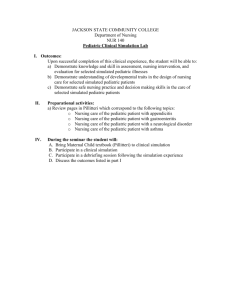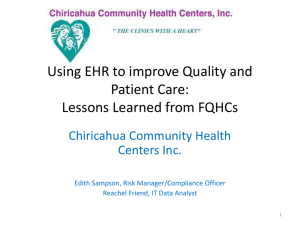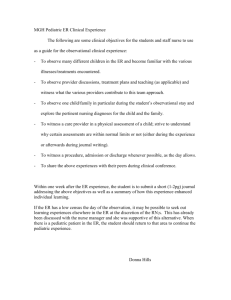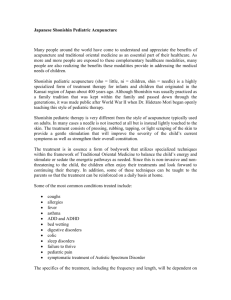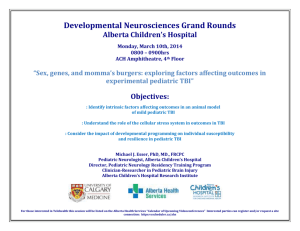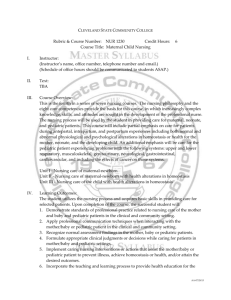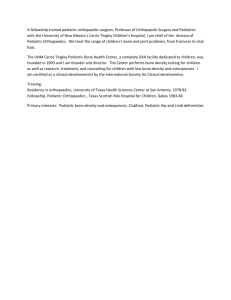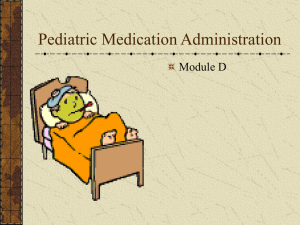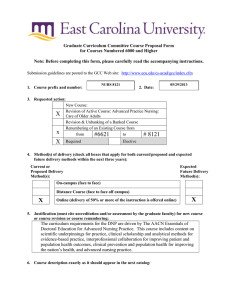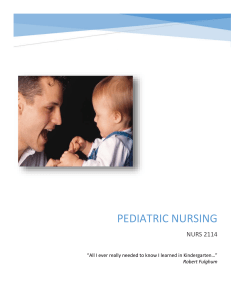NURS 8117
advertisement
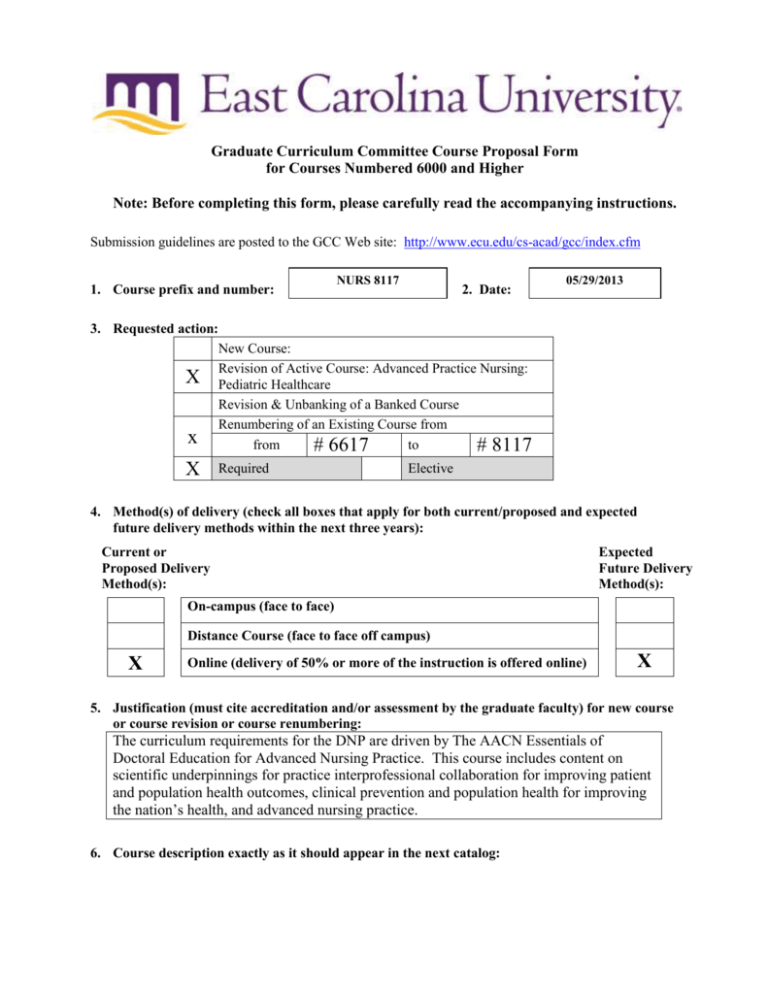
Graduate Curriculum Committee Course Proposal Form for Courses Numbered 6000 and Higher Note: Before completing this form, please carefully read the accompanying instructions. Submission guidelines are posted to the GCC Web site: http://www.ecu.edu/cs-acad/gcc/index.cfm 1. Course prefix and number: NURS 8117 2. Date: 05/29/2013 3. Requested action: New Course: of Active Course: Advanced Practice Nursing: X Revision Pediatric Healthcare Revision & Unbanking of a Banked Course Renumbering of an Existing Course from x from to # 6617 # 8117 X Required Elective 4. Method(s) of delivery (check all boxes that apply for both current/proposed and expected future delivery methods within the next three years): Current or Proposed Delivery Method(s): Expected Future Delivery Method(s): On-campus (face to face) Distance Course (face to face off campus) X Online (delivery of 50% or more of the instruction is offered online) X 5. Justification (must cite accreditation and/or assessment by the graduate faculty) for new course or course revision or course renumbering: The curriculum requirements for the DNP are driven by The AACN Essentials of Doctoral Education for Advanced Nursing Practice. This course includes content on scientific underpinnings for practice interprofessional collaboration for improving patient and population health outcomes, clinical prevention and population health for improving the nation’s health, and advanced nursing practice. 6. Course description exactly as it should appear in the next catalog: NURS 8117 - Advanced Practice Nursing: Pediatric Healthcare 4 Formerly NURS 6617 P: NURS 8114, 8115, or consent of program director. Provides a theoretical, scientific, and contemporary knowledge base and framework for assessment and management of the primary healthcare needs pediatric clients including culturally diverse urban and rural clients. 7. If this is a course revision, briefly describe the requested change: Revisions in course number, title, objectives and topical outline to meet the BSN to DNP program essentials. 8. Course credit: Lecture Hours 4 4 Weekly OR Per Term Credit Hours Lab Weekly OR Per Term Credit Hours s.h. Studio Weekly OR Per Term Credit Hours s.h. Practicum Weekly OR Per Term Credit Hours s.h. Internship Weekly OR Per Term Credit Hours s.h. Other (e.g., independent study) Please explain. s.h. 4 Total Credit Hours 25 9. Anticipated annual student enrollment: 10. Changes in degree hours of your programs: Degree(s)/Program(s) Changes in Degree Hours DNP/College of Nursing N/A 11. Affected degrees or academic programs, other than your programs: Degree(s)/Program(s) Changes in Degree Hours None s.h. N/A 12. Overlapping or duplication with affected units or programs: x Not applicable Documentation of notification to the affected academic degree programs is attached. 13. Council for Teacher Education (CTE) approval (for courses affecting teacher education): x Not applicable Applicable and CTE has given their approval. 14. University Service-Learning Committee (USLC) approval: s.h. x Not applicable Applicable and USLC has given their approval. 15. Statements of support: a. Staff x Current staff is adequate Additional staff is needed (describe needs in the box below): b. Facilities x Current facilities are adequate Additional facilities are needed (describe needs in the box below): c. Library x Initial library resources are adequate Initial resources are needed (in the box below, give a brief explanation and an estimate for the cost of acquisition of required initial resources): d. Unit computer resources x Unit computer resources are adequate Additional unit computer resources are needed (in the box below, give a brief explanation and an estimate for the cost of acquisition): e. ITCS resources x ITCS resources are not needed The following ITCS resources are needed (put a check beside each need): Mainframe computer system Statistical services Network connections Computer lab for students Software Approval from the Director of ITCS attached 16. Course information (see: Graduate Curriculum and Program Development Manual for instructions): a. Textbook(s) and/or readings: author(s), name, publication date, publisher, and city/state/country. Include ISBN (when applicable). Burns, C. E., Dunn, A. M., Brady, M. A., Starr, N. B., & Blosser, C. G. (2012). Pediatric primary care: A handbook for nurse practitioners (5th ed.). St. Louis: Saunders. ISBN-13: 978-0323080248 Colyar, M. R. (2003). Well-child assessment for primary care providers. Philadelphia: F.A. Davis Company. ISBN-13: 978-0-8036-1005-7 Habif, T.P., Campbell, J.L., Chapman, M.S., Dinulos, J.G.H., & Zug, K. A. (2011). Skin disease: Diagnosis and treatment (3rd ed.). Mosby: ISBN-13: 9780323077002 Hay, W., Levin, M., Sondheimer, J., & Deterding, R. (2012). Current diagnosis and treatment pediatrics (21st ed.). New York: McGraw Hill. ISBN: 978-0071779708 b. Course objectives for the course (student – centered, behavioral focus) Upon completion of this course, students will be able to: 1. Synthesize advanced nursing practice knowledge and theory of management of the primary health care needs pediatric clients including of culturally diverse urban and rural clients.. 2. Integrate models of health promotion, disease prevention and wellness to plan care and develop counseling and education for needs pediatric clients including of culturally diverse urban and rural clients.. 3. Apply evidence-based research findings, interprofessional competencies, and clinical practice resources to develop advanced nursing interventions to manage care of needs pediatric clients including of culturally diverse urban and rural clients. 4. Develop counseling and education plans related to the primary health care needs of needs pediatric clients including of culturally diverse urban and rural clients. 5. Develop diagnostic reasoning and clinical decision-making skills necessary to assess, diagnose, and manage needs pediatric clients including of culturally diverse urban and rural clients. 6. Examine ethical, legal, and interprofessional responsibilities and issues in the delivery of primary health care to needs pediatric clients including of culturally diverse urban and rural clients. c. Course topic outline Each module addresses cultural, ethical, legal, and interprofessional practice issues: Module 1 – Overview of pediatrics and interprofessional collaboration/care coordination, development: birth through adolescence Module 2 – Health promotion and perceptions in pediatrics Module 3 – The well-child exam (head-to-toe and inside-out) Module 4 – The sick or episodic exam; antimicrobial therapies; head, eyes, ears, nose, throat and dental issues; and gastrointestinal issues Module 5 – Cardiovascular issues and respiratory issues Module 6 – Infectious disease, atopic presentations and dermatology Module 7 – Neurological disorders and behavioral health concerns Module 8 - Musculoskeletal disorders/injuries and rheumatic disorders Module 9 - Endocrine & metabolic disorders and hematological disorders Module 10 - Genitourinary disorders and gynecological care and conditions Module 11 - Other pediatric issues in primary care d. List of course assignments, weighting of each assignment, and grading/evaluation system for determining a grade Grading Scale A= B= C= F= 93-100 92-85 84-77 < 77 Evaluative method: Exam #1 Exam #2 Exam #3 Final Exam Quizzes (Seven) Telecommunications Participation (Four) Virtual Clinic Case Special Topics Paper Total: 15% 15% 15% 20% 2% each 1.5% each 7.5% 7.5% 100%
